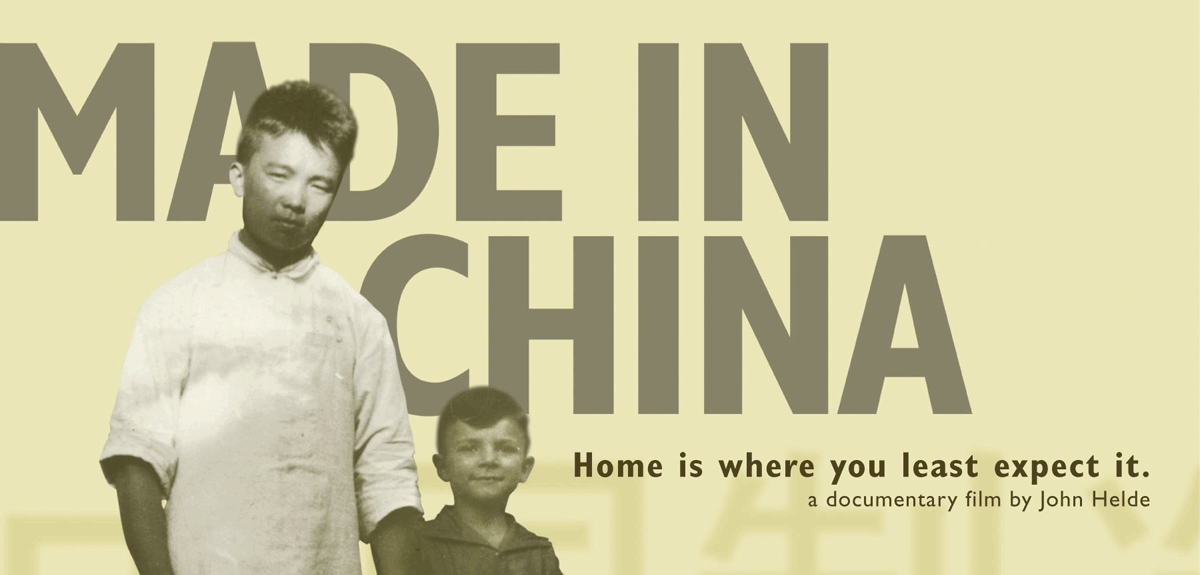



 |
Synopsis
At a time when the world's eyes are focused on China, Made in China uncovers a rare glimpse of America's connection to Chinese culture. This critically-acclaimed documentary follows the filmmaker on an international journey to uncover his white American fatherís remarkable childhood in pre-Mao China. Through stunning home movies, photographs and interviews, Made in China reveals an untold story of Americans whose cultural ďdouble-visionĒ shaped their lives. Ultimately, though, Made in China is the story of a sonís search to understand his father Ė and a poignant exploration of the meaning of home.
Director's Statement
Maybe itís because my own 1970ís suburban upbringing was so completely un-eventful by contrast - we never even moved once - that I became so fascinated with my fatherís childhood as a white American boy in China. Or maybe itís because he didnít talk about those years. So many of us grow quickly tired of our parentsí well-worn stories; but in my case I was well into adulthood before I realized just how much there was to know.
My father Tom was, in fact, the family storyteller. A history professor, he understood the importance of delivery; he also loved a good laugh. But he rarely entertained us with stories of his childhood. It wasnít until I was well into my thirties that I opened a book called Golden Inches, the journals of Grace Service. Grace and her husband Bob were close friends of my grandparents George and Ruth Helde, and they all made Chengdu, Sichuan their home in the early 1920ís, as Bob and George worked to establish a YMCA there. Inside the book, I found a photo of George and Ruth on the road to Chengdu, accompanied by a brace of smiling Chinese. I also found Graceís heart-wrenching story of my fatherís birth on Bailuding, a remote Sichuan mountain: my grandmother Ruth died there at the familyís summer home three days after she delivered my father.
Seeing the story in print, the dramatic circumstances of my fatherís first moments fully hit me. The idea of this special place - a place deep in China, where my father burst on the scene, losing his mother in the process - lodged itself in my consciousness. Then I came across a stash of photos Iíd never seen - my father as a boy in China, calmly holding the cookís hand on the porch, playing with his dog, exploring the marketplace, journeying up the Yangtze. The pictures felt like a window into another world. I realized I knew virtually nothing about my fatherís childhood. I also was beginning to realize how little I knew him.
Made in China sprang from the urge to uncover this story, a story that was much more personal than anything Iíd done. But when I started filming, and digging into my fatherís past, I found that such things do not come naturally to either him or me. Talking - especially about things not usually talked about - was not the most comfortable activity for us; and although I thought we should go back to the country he left in 1935, he seemed content to leave the past in the past. Suggestions from my dad led me to some of his childhood peers, and I traveled around interviewing them, looking for answers to the big questions of the story: What did it mean to grow up in a country so different from your parentsí "home" country? How did it feel to "return" to an America you hardly knew? What do you call "home" anyway? In their entirely unsurprising domestic surroundings, these aging Americans recounted a childhood far removed from what we think of as "American," often detouring into fluent Mandarin.
When my father died of cancer in December, 2003, just a year or so after I began shooting, I couldnít let the project end there. Going to China, even if on my own, felt like a way to linger in the connection we had formed, and to continue to explore the meaning of "home." I wanted to see what would happen when I tried to find his past in twenty-first century Shanghai, Changsha, and Chengdu; and I wanted to make it to Bailuding, his mountain birthplace - to see this mythical summit as real, and, hopefully, in some small way, close a circle.
-- John Helde, writer/director
Return to try this films




